Please introduce yourself (name, age, college, country, background)
Hi, my name is Caleigh Hernandez and I’m 27 years old. I’m founder of RoHo, an ethical accessories brand and have been a Resolution Fellow since 2015 through the Clinton Global Initiative.
I became interested in everything RoHo in 2013 on my first trip to East Africa, while living with a host family in rural Uganda and interning for a local community-based organization. While walking through the craft markets, I saw a pair of gorgeous leather sandals and was hooked. I returned to Uganda the following summer to conduct independent research on small-scale entrepreneurs while also developing my idea for RoHo. Since then, I’ve been off the ground running! RoHo was selected as one of 50 projects featured in the United Nations Sustainable Development Solutions Network Youth Solutions Report, and my work has been highlighted in Forbes.
I have also worked as a Research Assistant for the Eleos Foundation, an organization that invests in market-based solutions to poverty alleviation in Africa, as well as the Center for Complex Operations, a security think-tank. I graduated cum laude from Northwestern University in 2015 with a BA in Political Science and International Studies. After graduation, I moved to rural Tanzania and Nairobi, Kenya through a Princeton in Africa Fellowship, working for the International Rescue Committee.
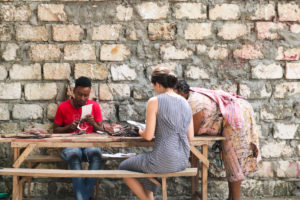
What three adjectives would people use to describe you?
Driven, straightforward & compassionate
What is your favorite book and why?
Shantaram by Gregory David Roberts is such a moving and beautifully written story. I love the power and humanity it brings to its characters and the adventures.`
What is the challenge your venture seeks to address?
We’re working to create access to opportunities for those who may not have ways to lift themselves out of their situations.
Have you been personally affected by this issue? If so, how?
Yes, although definitely not to the extent of many of our artisans. Growing up in Santa Barbara, California, and Park City, Utah, I had a really nice childhood. My mom was successful in her career and we were financially stable. When the 2008 recession hit though, my family lost everything. While I was in high school and beyond it was a challenge for my family to get by financially. It was a time in my life that forced me to grow up quickly, adapt, and reflect on what it means to have and not have.
It was at this time that I began learning about privilege and the access it affords, which impacts my work today.
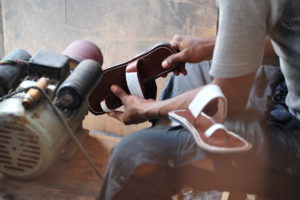
How is your venture addressing these challenges?
At RoHo, we partner with talented artisans in Kenya and sell their beautiful wares while also paying them fairly and creating educational opportunities for their children. We seek to assist in community development with our artisans, to build stronger, more resilient communities who have more opportunities to grow.
The RoHo ethical fashion line includes beaded leather sandals, beaded jewelry, reusable bags, and a collection of cowhide totes, clutches & journals. RoHo pays artisan wages far higher than the industry standard, ensures artisans are working in a safe environment, and provides education grants to send their children to quality schools. We are committed to educating consumers on the difference between these slower fashion principles and those of fast fashion outlets.
RoHo believes that poverty is an absence of opportunity as much as a lack of material possessions. We seek to create opportunities in areas with vast amounts of artisanal talent, but amongst vulnerable populations with high unemployment rates, limited infrastructure, and poor education services. By creating new American markets for quality, artisan-made products, RoHo is helping people help themselves break the cycle of poverty. Providing safe and quality jobs to skilled artisans is key to supporting community development.
In addition to our original mission, since COVID-19 has hit Kenya, many RoHo artisans are food insecure. For the past several weeks it has been our commitment to ensure our artisans and their families have access to the food and healthcare they need during this uncertain time while our supply chains are disrupted.
What does your venture hope to achieve?
Through RoHo, we would like our artisans to become members of the middle class. This financial stability ensures they can provide for themselves and their families, afford healthcare and quality education, and withstand household shocks.
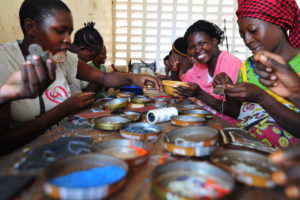
What inspired you to start your venture?
To be honest I never thought I would be running a sandal and accessories company, although some may call it fate because my first words as a child were “New Shoes”. It started when I came across a pair of beautiful beaded leather sandals in a craft market in East Africa. These markets are dark, dingy, rarely have electricity and if they have concrete floors, they are cracked. I distinctly remember looking over my shoulder because something caught my eye. It was a pair of gorgeous, glittering, uniquely beaded leather sandals. I knew instantly they had incredible potential to make a meaningful difference in the lives of the artisans and the American women who would wear them.
The next year, while in Uganda conducting research, I began mapping out the East Africa sandal industry. I’d ask local shopkeepers who made the best sandals in the area. I was continually told to look for “Fat Lydia” (I want to interject by saying the term “fat” in East Africa doesn’t have a negative connotation, in fact it’s more of a compliment). In any case, I was told, “Not the skinny Lydia, she’s a big woman, the Kenyan. You’ll know her when you see her”. I was told what part of town she’d be in, so I took a motorcycle taxi and off I went. It sounded easy, but it took me hours of searching. Three different motorcycle taxis taking me to the wrong parts of the city, I was lost wondering what the heck I was doing in this foreign country, but I finally found her.
We sat on tiny wooden stools in one of her pop-up craft shops speaking for close to two hours. I explained my idea of importing her shoes to the US and creating a social business. She told me about Kenya, her background as a woman entrepreneur and single mother, the 42 artisans she works with, 36 women and six men, and the intricacies of sandal-making.
Lydia told me about the town where the sandals are made. Gorgeous sand beaches, beautiful Middle Eastern influences, lively and fantastic people, and unemployment rates upwards of 40%. I could see there were gaps and needs in this community and knew right then and there that I could be helpful to Lydia and her artisans. Thus, the business relationship and friendship started in a slightly unorthodox, possibly stalker-ish way on my part.
I stayed in contact with Lydia and started working on developing a sandal line with her that was marketable for consumers in the US. As the desire for beautiful and unique products increased in the US, RoHo fostered partnerships with three additional quality, talented, and underserved artisan groups in Kenya to broaden the RoHo product line.
Yes, the sandals really got me hooked, but it was also my experience working on the ground for various nonprofits in East Africa that solidified my passion for the area and economic development in general.
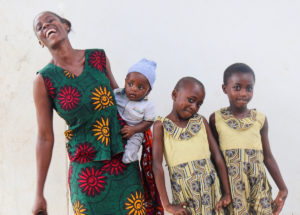
What excites you about the Resolution Fellowship?
The Resolution Fellowship has provided resources and support to get this venture off the ground. They are my safety net and cheerleading squad.
How will the Fellowship help you achieve your goals?
My Resolution Fellowship provided me startup capital to get RoHo launched and continues to provide mentorship. There are so many things I didn’t know that I didn’t know going into business – Resolution helped to bridge that gap.
What advice would you give other college students who are looking to start their first social venture?
Listen deeply to the needs of those you are trying to help. When I first started RoHo, I had an idea to address the systemic unemployment that existed in the coastal Kenyan town by using RoHo profits to establish a vocational school to train interested community members in marketable beading and leatherwork skills. But reviews were mixed when I discussed this with our sandal-making artisans during a community meeting. They explained that the county is inundated with training sessions, but it has not helped the unemployment rates in the area.
We shifted our focus to our artisans and their families because we felt like we could have a better impact if we started smaller and with a group we knew well. We raised the question about how to reduce poverty to our artisans and came to the conclusion together that in the longer term, education is key to reducing poverty. However, school fees for quality local schools have proved burdensome, which is why we began providing educational grants to our artisans’ children for quality local schooling.
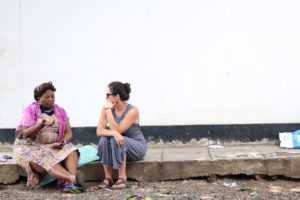
What do you love most about your host community?
I love the communities we work with through RoHo. They are resilient, strong and all have a wicked sense of humor. I love most that they understand our commitment to their success and in turn work to ensure they are providing top-notch products for our customers.
Why is it important for young people to focus on social impact?
It is important for everyone to focus on social impact, not just young people! Long story short, we are all in this together and it is time we started acting like it.
What are your goals for the future?
I’m committed to social change throughout my career, and this will be through RoHo for some time to come. In the long term, I’d like RoHo to be a hub of ethical fashion. We won’t be focused exclusively on Kenya; we will be highlighting artisan groups from across the world.
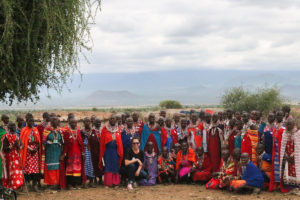
What have you been working on in response to COVID-19?
When COVID-19 hit, I was incredibly depressed. Our supply chains were disrupted, and 75% of our artisans and their families were food insecure, about 1,500 people. The combination of COVID-19 and a severe locust infestation has resulted in food shortages coupled with a work shutdown. But with RoHo sales down, I felt there was little I could do about the problem. That’s when I got on a phone call with a mentor of mine who essentially told me it was time to pick myself up and figure something out. It was tough love but desperately needed. And that same day, my mom came to me and reminded me of all the African kitenge and batik fabric we’ve been gifted or have bought in our travels to East Africa. She thought we should start making masks. And that’s when I became not only an entrepreneur but an artisan myself.
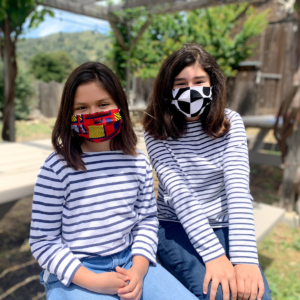
I enlisted the help of my mom and together we began turning these fabrics into face masks which we would sell and direct the profits towards food security in Kenya. My mom has some sewing experience, but I’d consider myself one of the least crafty people out there. The sample masks weren’t perfect, but the fabrics were beautiful, double-sided washable and most of all, durable.
I got my sister, a photographer, to take photographs of the masks and posted them online. We were overwhelmed with the response! In the first 24 hours, we sold nearly 60 masks (keep in mind, we had none in inventory at the time). And the orders continued to pour in. We began working tirelessly at my kitchen table to fulfill orders with a 24-hour turn-around time. I recruited my boyfriend and grandmother to begin sewing, ironing, and pinning as well. We borrowed sewing machines, drove hours around southern California to secure elastic, and quickly ran out of our own inventory of fabric and had to order from an African fabric distributor.
Just as orders began to slow down, a friend purchased 75 masks to be distributed to Bellevue Hospital in New York City. She had heard their volunteer staff were in need of alternative PPE and decided to gift the masks. For the sewing crew at my house, the order was a labor of love combining securing food for RoHo artisans in Kenya and sending masks to areas who desperately need them.

And that got me thinking, why not offer RoHo consumers the ability to gift masks to those in need? Within days, we created partnerships with Doctors without Walls (DWW), the MD Anderson Cancer Center at Cooper University Hospital in Camden, New Jersey, and Second Harvest Food Bank in New Orleans.
To date, RoHo has made nearly 1,000 masks that have been sold and donated to their partners. Through this project, we have been able to ensure our at-risk artisans and their families are food secure at least through mid-June. We have added kids’ masks to the collection as well in order to appeal to a broader audience, and we’re only getting started.